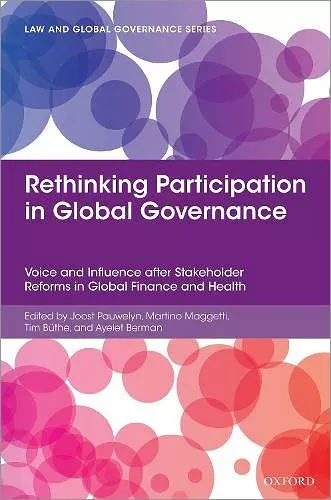Rethinking Participation in Global Governance
Voice and Influence after Stakeholder Reforms in Global Finance and Health
Joost Pauwelyn editor Martino Maggetti editor Tim Büthe editor Ayelet Berman editor
Format:Hardback
Publisher:Oxford University Press
Published:2nd Jun '22
Currently unavailable, and unfortunately no date known when it will be back

International organizations and other global governance bodies often make rules and decisions without input from many of the individuals, groups, firms, and governments that are affected by them. The standards of the Basel Committee on Banking Supervision, for instance, developed by a small number of states, govern financial markets and the safety of bank deposits in over a hundred jurisdictions. Historically, the interests of developing countries, as well as non-commercial and diffuse interests within countries, have been excluded or disregarded in global governance. Scholars and practitioners have criticised this democratic deficit and called for greater participation of such marginalized stakeholders. Against this background, international institutions have introduced a variety of reforms with the goal of increasing and facilitating the participation of these excluded stakeholders. This book brings together an expert group of scholars and practitioners to investigate the consequences of stakeholder participation reforms in the global governance of health and finance: What reforms have been introduced? Have these reforms given previously marginalized stakeholders a voice in global governance bodies? What effect have these reforms had on the legitimacy and effectiveness of global governance? To answer these questions, the book examines treaty-based intergovernmental organizations alongside newer forms of global governance such as trans-governmental regulatory networks, multi-stakeholder partnerships, and private standard setting bodies. Through a series of paired comparative analyses, the book provides insights into the experiences of large emerging and smaller or lower income developing countries (Brazil v. Argentina, China v. Vietnam, India v. the Philippines) in a diverse set of organizations, including the World Bank and the World Health Organization, the Basel Committee on Banking Supervision, the Global Fund to Fight AIDS, Tuberculosis and Malaria, the International Accounting Standards Board, Codex Alimentarius Commission and more.
Combining rich empirical studies and insightful conceptual frames, this monumentalwork shows how and why procedural mechanisms to provide traditionally disregardedstakeholders with participation and influence in global administrative bodies have orhave not succeeded. A landmark that will define the field for many years to come. * Richard Stewart, John Edward Sexton Professor of Law, New York University *
This volume offers comprehensive yet careful analyses of participatory reforms inglobal governance. Its comparative focus on finance and health governance providesrich, compelling evidence that reforms on paper do not always translate into meaningfulchange in practice. The editors successfully cull powerful insights into the possibilitiesand barriers to participation in global governance. * Beth Simmons, Andrea Mitchell University Professor in Law, University of Pennsylvania *
Contains a truly comprehensive assessment of stakeholder participation in globalfinancial and health institutions. The authors offer a compelling account of thesechanges and explore their impact on the legitimacy of global governance. A must-readfor all who are interested in these critical questions for the future of global governance. * Michael Zürn, Director of Research Unit Global Governance, Social Science Center (WZB) Berlin *
This rich volume explores the conditions that allow previously excluded stakeholders,particularly those from the Global South, to influence global decision. This perfectlytimed volume provides a nuanced study of how to bring more voices to the table andoffers a fresh vision of multi-stakeholder governance. * Rachel Brewster, Jeffrey and Bettysue Hughes Professor of Law, Duke University *
An ambitious comparative study that grapples with the salient issues of stakeholderparticipation, voice and influence, and the continuing democratic deficits in the fastevolvingglobal governance landscape. The book systematically examines stakeholderparticipation across two policy domains, six emerging economies and several nongovernmentbodies—and provides us with a conceptual framework for thinking aboutpotential reforms of global institutions. Thoughtful and empirically rich, this is a mustread for all who are interest in how representation can be improved in global governance. * David Coen, Vice Dean and Head of Department, Department of Political Science, University College London *
The book stands as an invitation to continue to invest in these institutions and other mechanisms of global governance: to study, reform, and refine them; enhance their representativeness; and resist their privatization. It will surely seed further normative and empirical work aimed at facilitating these aims. * Melissa J. Durkee, The American Journal of International Law *
ISBN: 9780198852568
Dimensions: 240mm x 165mm x 35mm
Weight: 976g
544 pages